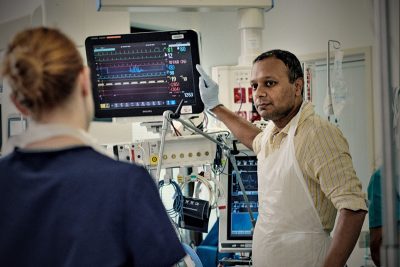Caboolture Hospital diabetic research attracting global attention
A project trial started at Caboolture Hospital to define the best choice of fluid therapy for patients with severe diabetic ketoacidosis (DKA) is now attracting global attention.

Dr Mahesh Ramanan is investigating whether alternative fluids provide better outcomes for DKA patients.
Dr Mahesh Ramanan, an Intensive Care Unit (ICU) Staff Specialist at Caboolture and The Prince Charles Hospitals, started researching the topic in 2018 with an early pilot clinical trial showing promising early results. He was able to use the pilot results to design a large national Phase 3 trial, the BEST-DKA trial.
Now, an Australian Government Medical Research Future Fund (MRFF) Clinical Trials Activity Grant, administered by renowned international global research group The George Institute, has provided $1.65 million for Dr Ramanan to conduct the BEST-DKA trial and continue investigations into whether alternative fluids provide better outcomes for DKA patients.
BEST-DKA has also received funding from the Emergency Medicine Foundation, Diabetes Australia, and Baxter Pharmaceuticals.
Diabetic ketoacidosis is a life-threatening complication of diabetes in which the body produces excess blood acids known as ketones. It occurs when there is not enough insulin in the body and can be triggered by infection or other illness. It can occur in any type of diabetes – including type one, two and gestational diabetes.
The incidence is rising in Australia, particularly in metropolitan and rural or regional hospitals – approximately 3,000 people with the condition are admitted to Australian ICUs each year, according to data stored at the Australia and New Zealand Intensive Care Society registries.
Fluid therapy is a vital component of the treatment of DKA, but which fluid provides the best outcomes is unknown.
Saline is widely recommended in national and international guidelines despite a lack of high-quality evidence to support its use. It can lead to complications associated with worse outcomes in critically ill patients.
Dr Ramanan has identified an alternative fluid, Plasma-Lyte 148, a balanced salt solution which more closely matches the biochemistry of human blood and has theoretical advantages over saline. He will work with the Critical Care Division at The George Institute and other clinical researchers around Australia to evaluate whether Plasma-Lyte 148 increases days alive and out of hospital for patients with DKA.
Dr Ramanan hopes the results will provide definitive guidance on the best choice of fluid therapy for patient care and reduce healthcare costs.
Dr Mahesh Ramanan, an Intensive Care Unit (ICU) Staff Specialist at Caboolture and The Prince Charles Hospitals, started researching the topic in 2018 with an early pilot clinical trial showing promising early results. He was able to use the pilot results to design a large national Phase 3 trial, the BEST-DKA trial.
Now, an Australian Government Medical Research Future Fund (MRFF) Clinical Trials Activity Grant, administered by renowned international global research group The George Institute, has provided $1.65 million for Dr Ramanan to conduct the BEST-DKA trial and continue investigations into whether alternative fluids provide better outcomes for DKA patients.
BEST-DKA has also received funding from the Emergency Medicine Foundation, Diabetes Australia, and Baxter Pharmaceuticals.
Diabetic ketoacidosis is a life-threatening complication of diabetes in which the body produces excess blood acids known as ketones. It occurs when there is not enough insulin in the body and can be triggered by infection or other illness. It can occur in any type of diabetes – including type one, two and gestational diabetes.
The incidence is rising in Australia, particularly in metropolitan and rural or regional hospitals – approximately 3,000 people with the condition are admitted to Australian ICUs each year, according to data stored at the Australia and New Zealand Intensive Care Society registries.
Fluid therapy is a vital component of the treatment of DKA, but which fluid provides the best outcomes is unknown.
Saline is widely recommended in national and international guidelines despite a lack of high-quality evidence to support its use. It can lead to complications associated with worse outcomes in critically ill patients.
Dr Ramanan has identified an alternative fluid, Plasma-Lyte 148, a balanced salt solution which more closely matches the biochemistry of human blood and has theoretical advantages over saline. He will work with the Critical Care Division at The George Institute and other clinical researchers around Australia to evaluate whether Plasma-Lyte 148 increases days alive and out of hospital for patients with DKA.
Dr Ramanan hopes the results will provide definitive guidance on the best choice of fluid therapy for patient care and reduce healthcare costs.
